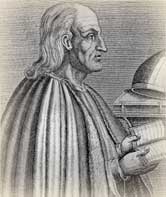
When St. Anselm died
on this day, April 21,
1109, the church was poorer by a great mind and England by a
zealous reformer. Anselm won a name for reform because he attempted to
end abuses such as the slave trade. He urged the holding of regular
synods and, while he was archbishop, enforced clerical celibacy within
his see. Because of his powerful intellect, some scholars consider him
one of the creators of scholasticism. But his most notable gift to
history was what has become known as the ontological proof for the
existence of God.
Can the existence of God be proven? Anselm thought so. Modern
philosophers and theologians disagree. However, it is Anselm's argument,
the ontological proof, which remains the most troublesome for them to
disprove.
Anselm's argument went something like this: When we discuss the
existence of God, we define him as a perfect being, greater than
anything else which can be conceived. If God does not exist, then the
name "God" refers to an imaginary being. This makes the
definition of "God" contradictory, for to be real, to be
living, to have power is greater than to be imaginary. It is clear I
cannot even discuss the word "God" as defined if he does not
exist, because I have to conceive of him as really existing in order for
him to be greater than anything else, for a God who does not exist is
not greater than anything else.
In short, no philosopher can legitimately argue that God does not
exist if he defines God as a perfect being greater than any which can be
imagined; for to be perfect, God must have real existence. Those who
acknowledge He exists do not have a problem with self-contradiction when
they affirm his existence. Since we can indeed raise the question of
God's existence and argue the point, then God must exist. Bertrand
Russell, one of the greatest logicians and mathematicians of the
Twentieth Century, no friend of Christianity, grappled with Anselm's
proof and at one time is said to have thought the proof worked.
As Archbishop of Canterbury, the zealous Anselm struggled with King
William for church rights. He was exiled. Similar conflict would shortly
afterward lead to the murder of Becket. As a theologian, the pious
Anselm is remembered for his book,
Why Did God Become Man? In
it he argued that each of us has run up such a debt of sin that there is
no way we can repay God. Christ, as infinite God, has merit enough and
to spare to pay our debts. As a scholar, the learned Anselm argued that
we must believe in order to understand. We could restate
his insight in modern terms like this: truth only begins to come clear when one is
committed to it. You cannot see around a bend in a trail unless you walk
toward it.
Anselm died surrounded by friends who placed his body in ashes on the
floor. He was probably canonized in 1494, although there is debate
whether this occurred at all. His beatific status aside, Anselm will
long be remembered as the author of the ontological proof.
Bibliography:
- "Anselm, St". Dictionary of National Biography.
Edited by Leslie Stephen and Sidney Lee. London: Oxford University
Press, 1921 - 1996.
- "Anselm, St." The Oxford Dictionary of the Christian
Church. Edited by F. L. Cross and E. A. Livingstone. Oxford: Oxford
University Press, 1997.
- Copleston, Frederick. A History of Philosophy. Westminster,
Maryland: Newman Press, 1953-
- Dark, Sidney. Seven Archbishops. London: Eyre &
Spottiswoode, 1944.
- Dictionary of the History of Ideas. Scribner's, 1974.
- Eadmer. The Life of St. Anselm, Archbishop of Canterbury.
Edited with introd., notes, and translation by R.W. Southern. New York:
T. Nelson, 1962.
- Hook, Walter Farquhar, 1798-1875. Lives of the Archbishops of
Canterbury. London: R. Bentley, 1865 - 1884.
- McKilliam, Annie E. A Chronicle of the Archbishops of
Canterbury. London: J. Clarke, 1913.
- Rigg, J. M. St. Anselm of Canterbury, a chapter in the history
of religion. London: Methuen & co., 1896.
- Rule, Martin. The Life and Times of St. Anselm: Archbishop of
Canterbury and Primate of the Britains. London: Kegan Paul, Trench,
1883.
- Runes, Dagobert D. A Treasury of Philosophy. New York:
Philosophical Library, 1945.
- Russell, Bertrand. Wisdom of the West. New York: Fawcett,
1964.
- Various encyclopedia and internet articles and references in
histories of philosophy.
Read this article at - http://www.christianity.com/church/church-history/timeline/901-1200/anselms-subtle-proof-of-gods-existence-11629798.html
 When St. Anselm died on this day, April 21,
1109, the church was poorer by a great mind and England by a
zealous reformer. Anselm won a name for reform because he attempted to
end abuses such as the slave trade. He urged the holding of regular
synods and, while he was archbishop, enforced clerical celibacy within
his see. Because of his powerful intellect, some scholars consider him
one of the creators of scholasticism. But his most notable gift to
history was what has become known as the ontological proof for the
existence of God.
When St. Anselm died on this day, April 21,
1109, the church was poorer by a great mind and England by a
zealous reformer. Anselm won a name for reform because he attempted to
end abuses such as the slave trade. He urged the holding of regular
synods and, while he was archbishop, enforced clerical celibacy within
his see. Because of his powerful intellect, some scholars consider him
one of the creators of scholasticism. But his most notable gift to
history was what has become known as the ontological proof for the
existence of God.
Comments 0